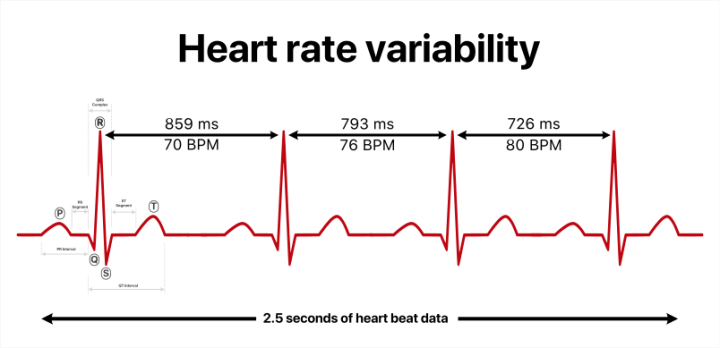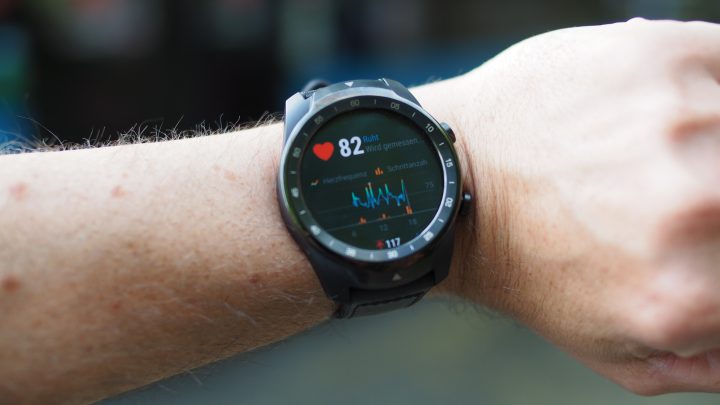
Tracking different health metrics has never been easier than today. Even in our own homes we can easily check our blood pressure, weight, caloric intake, blood sugar, and heart rate.
Speaking of heart rate, when it comes to running, back then only elite athletes had the technology to monitor and do heart rate training. Nowadays, anyone with a fitness watch can do just that.
As a runner, it was important for me to understand how to properly monitor my heart rate so I could train and race more efficiently. And just when I thought my research was done, I stumbled upon a concept called Heart Rate Variability.
This caught my interest which is why this article will be focusing on HRV and what this can mean for your overall fitness.

WHAT IS HEART RATE VARIABILITY?
Your heart rate is the amount of times your heart beats in a minute. At rest, on average, a person’s heart can heat anywhere between 60 to 100 times per minute.
If you’re manually checking your pulse it can seem consistent, but it’s actually not. The timing between heartbeats fluctuates. This means that the interval between two beats could be 0.09 seconds or even 1.15 seconds.
Heart Rate Variability is simply the fluctuation in time between heartbeats.
WHY CHECK FOR YOUR HRV IN THE FIRST PLACE?
HRV has been found to be closely linked to general well-being, both physically and mentally, as well as performance in physical and cognitive tasks, resilience, and the capacity to handle stress in a healthy manner.
Here’s more reasons to monitor your Heart Rate Variability:
Detect stress levels: People with high HRV rarely experience high levels of stress and have a strong cardiovascular system. On the other hand, people with low HRV tend to easily experience acute stress. Monitoring your HRV can help you respond to stress in a healthier way.
Increased self-awareness: Monitoring your HRV will increase your own awareness of how you live along with how your behavior to both internal and external factors affect your nervous system.
Improved lifestyle habits: Understanding the importance of knowing your HRV levels and actually monitoring it is a great way to know if you’re living a healthy life. This can help motivate those who are considering taking steps towards living a healthier life.
WHAT DOES A HIGH OR LOW HRV MEAN?
High heart rate variability is correlated with greater health and performance. This happens when your autonomic nervous system (ANS) is balanced. This means that you can adapt well to any internal or external factors that come your way.
People who have high HRV are also more likely to have a strong cardiovascular system and may be more resilient to challenges, both physical and mental.
However, if HRV is low, this means that your body is exerting more effort to adapt to the environment or recover from a stressor. If you noticed that your HRV has been low for the past few days you may have been overtraining or experiencing too much stress.
HOW DOES HRV RELATE TO FITNESS?
Having a high heart rate variability means that your body is more than capable of responding well to internal and external stressors. This is a strong sign of a healthy nervous system and a sign of a strong body that is responsive to its environment and able to perform at its best.
This is particularly important for athletes like runners, as a higher HRV can mean that the body is better able to adapt to the demands of exercise and recover more quickly after an intense workout.
On top of that, tracking HRV can help athletes of all levels optimize their training and recovery by providing insight into their body’s stress response.
HOW CAN YOU IMPROVE YOUR HRV?
Now that we understand how important it is to have a high heart rate variability, especially as athletes, now let’s talk about how to improve it:
Smart and efficient training: Regular physical activity is important for your cardiovascular system and your HRV, but make sure not to overdo it. Give your body enough time to rest and recover especially after a hard workout session.
Proper hydration: Your blood will circulate and deliver nutrients to your body easier if you’re well hydrated. Make sure to take in enough water per day.
Avoid smoking and alcohol: Both bad habits can damage your heart over the long term and negatively affect your HRV.
A proper and well balanced diet: Eating a healthy diet that is rich in fruits, vegetables, and omega-3 fatty acids can help improve HRV.
A good night’s sleep: Improving your sleep regime, such as by maintaining a consistent sleep schedule and avoiding screens before bedtime, can help improve HRV.

HOW CAN YOU TRACK YOUR HRV?
So now that you know the importance of monitoring your HRV and the steps you should take to improve it, the next question to answer is how can we actually track it.
Here’s a few fitness gadgets available in the market that will do the job:
1. Oura Ring: This costs around PHP15,000 and can be purchased on Oura Ring’s official website.
2. HRV4Training Mobile App: The mobile app costs PHP499 and is available on the Apple App Store and Google Play Store.
3. Coros Vertix 2: This costs PHP40,999 and can be bought on Active Gears PH
4. Garmin Forerunner 945: This costs PHP37,675 and can be purchased on Garmin PH’s official website.
5. Polar Vantage V2: This costs PHP32,790 and can be bought on Boundless PH
6. Fitbit Versa 3: This costs around PHP11,000 to PHP11,500 and can be purchased on Lazada, Shopee, and Zalora






